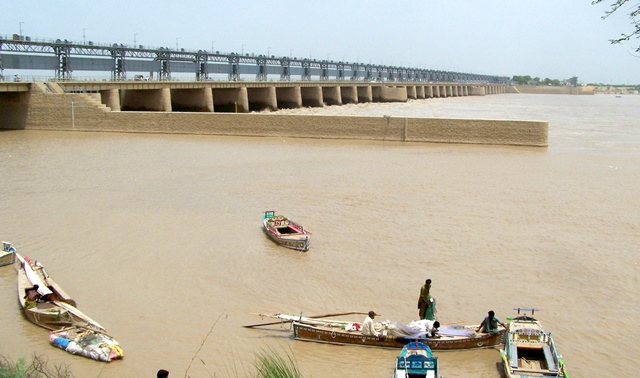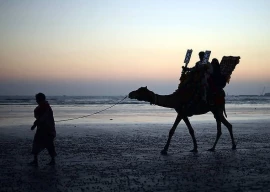
The second round of dialogue between water experts from Pakistan and India ended on a fruitless note as India refused to change the designs of its Kishanganga Dam.
Pakistan’s Indus Water Commissioner, Mirza Asif Baig, said that they are currently in talks with their Indian counterparts over this issue. However, if India continues to adopt a rigid position, Pakistan would have to request the International Court of Justice (ICJ) to intervene and broker a settlement.
A 10-member Indian delegation from the Indus Water Commission in India is on a three-day visit to Lahore to discuss the prolonged water issues between the two countries.
“Our objections over the design on Kishanganga dam are logical and we have also raised serious doubts on Kishanganga project at Neelum distributory point on River Jhelum and four other points on River Chenab,” Baig said. He added that the Indus Water Commission is trying its best to persuade the Indian team to accept its objections in light of the Indus Water Treaty (IWT) ratified in 1960.
Under the provision of the IWT, the western rivers – Indus, Jhelum and Chenab – were allocated to Pakistan and the eastern rivers – Sutlej, Beas and Ravi – were given to India. But only India was allowed to use the rivers to generate hydropower.
According to Baig, the second day of the meetings with the Indian team remained largely ineffective. On the contrary, both sides simply put forward their own proposals, justifications and feedback on the designs for the hydro-power project.
The talks will resume on Tuesday (today).
However, Baig insisted that Pakistan cannot wait for such a long period of time to resolve the issues through, what appear to be, a series of inconclusive dialogues.
“If these talks do not have the desired effect, we will ask the government to request ICJ to resolve the matter. We are willing to complete all the requisite procedures through our ministries just to ensure that the matter is finally dealt with,” he said.
Pakistan’s stance on the Indian projects was both clear and logical and authorities would try to prove this in the ICJ, he said.
Published in The Express Tribune, August 26th, 2014.
COMMENTS (19)
Comments are moderated and generally will be posted if they are on-topic and not abusive.
For more information, please see our Comments FAQ









































@Tauseef H. Farooqi: You already sought arbitration on Kishanganga, the international arbitrators ruled that Kishanganga can be buiolt. This whole idea of taking it to ICJ is just a few paid junkets to some babus. It is unlike that ICJ would even admit this case after the international arbitration ruling in India's fabor.
You cannot discuss Kashmir because after the Hurriyat stunt Abdul Basit pulled, India is unwilling to discuss it with you.
@Tauseef H. Farooqi: Most certainly. There is certainly a lot to be discussed regarding that as well. For example, the modalities of the Pakistanis vacating the Indian territory of Jammu and Kashmir that is under Pakistan's illegal occupation since 1947. Just let us know when you want to discuss it. Although we would prefer discussing it over a video conference given the incidents of polio that have become so rampant in Pakistan of late.
I think,they(Pakistani Bureaucrats) just love to take this matter to ICJ,They win always : 1. To make cut out of consultant/attorney money paid in millions and 2. Have a govt paid holiday in Hague.
..
From past precedence, ICJ seems to be just a ploy by some bureaucrats to get free expense paid trips to the Netherlands. If one looks at the Kishanganga judgement, it is clear that Pakistanis did not have crucial data to justify their claims.
As @Rudra mentions, none of these newer dams are built or operated by the Indian government. Those involved in the engineering of the projects are publicly listed companies such as L&T, NHPC, SJVN, BHEL, GE, Westinghouse, etc. and for them profit is the sole motive. In many cases, capital financing has been provided in addition to the Government of India by World Bank, ADB, JICA, etc.
Everybody seems talking in air,pakistan has already approached ICJ on Kishanganga case and i think its verdict was given last year (2013) and that too in favour of India,paksitan lost that case and it cannot re appeal that case anymore.Pakistan’s Indus Water Commissioner is dreaming to take the Kishanganga case again to the ICJ and seems to be unware that their appeal will be flatly rejected cuz the verdict on that case was already given in favour of India and one cannot take the same case to the ICJ again.Pakistan’s Indus Water Commissioner should have verified before giving statements whether his govt has already taken that case to ICJ before or not.
@far Sight: Indus Water Treaty is an International agreement suggested by world bank, with India has the right to cancel it anytime for being upper feeder. It is the world most generous treaty given by a country to another.
@Tauseef: What do you exactly want for resolution of Kashmir Issue? Indian Muslims already got 25% of land in 1947 as per their population at that time and demanded by Jinnah? Jinnah never asked for bifurcation of Kashmir.
@Tauseef : so , you wish to take Kashmir issue to ICJ ? Well you are most welcome as In previous time It was Pakistan who go to ICJ . So , y not even dis time ? Bczz ICJ Will reject allegation untill or unless Pakistan Move its army out of PoK . So , plz read the so called UN Agreement first . Meanwhile , Indians are clever first dey will not agree Bcz dey keep it to two Party argument no third party and it was proved Recently . Plus we will bring Simla Agreement it will be fun when we will show document with Pakistan PM Signature .
Just curious: Is India legally bound to obey decision of ICJ? I thought Indian Government is only answerable to Supreme Court of India.
Unfortunately, water dispute can not be resolved individually by Pakistan alone. No ICJ nor UN can intervene. That is why good relations with India is so important to get anything from India.
@Tauseef H. Farooqi: Because we have better things to do/solve in our country than this. Its core issue to you. Where as for us it comes last second last in our scheme of things such as economics,development, anti-terror,health,education,space science etc. And before you advise india read UN charter and Simla agreement and what Pakistan is required to do before india holds plebiscite. Do that and then talk to india. It's you who are not willing to take those steps About ICJ feel free to go, indian business/ investors don't invest crores and millions of rupees in dam projects only to learn it goes against indus water treaty and then get blocked. They value their money too much to flush down the drain like that, and follow the rules accordingly or around it so no one can block it.
@Tauseef H. Farooqi: Instead of writing, I would run to UN and ICJ and file them.
I was wondering if Indian delegation can come to discuss water issues, why can't we discuss Kashmir issues as well - failing which we can surely seek arbitration - especially when my Indian friends are so confident of wining over so many times the water issues in past in ICJ :)
I hope they know that ICJ cannot intervene unless both the parties voluntarily approach them. Its an arbitration court not a world police.
" Pakistan’s stance on the Indian projects was both clear and logical and authorities would try to prove this in the ICJ, he said." +++++++++++++++++++++++++++++++++ Same logic that has handed Pakistan defeat after defeat at ICJ in previous cases.
" “If these talks do not have the desired effect, we will ask the government to request ICJ to resolve the matter." +++++++++++++++++++++++++++++++++++ What Govt? Huh?
This is so typical of Pakistan's cussedness. You are unable to do any productive work - and when you see something actually beneficial for Kashmir from India, you want to block it. Just like previous occasions, all Pakistan wants to do is delay Indian projects. There's no chance of you winning the case in ICJ anyway. And you claim to support Kashmir...
Pakistan will do well to learn from history before indulging in empty talk of taking India to the International Court of Justice.
India excludes all disputes involving India from the jurisdiction of International Court of Justice in respect of any country which is or has been a Member of the Commonwealth of Nations. The ICJ has accepted India’s jurisdiction exclusionary right when Pakistan’s August 1999 case was thrown out of the ICJ by the ICJ themselves in their June 2000 judgment.
Sindh, Balochistan and Pakistan Occupied Jammu & Kashmir may not have the capability to stand up against Pakistani Punjab Provinces water gluttony and theft, but be assured that India on the other hand will ensure that Indian citizens in Jammu and Kashmir are not deprived because of Pakistani Punjab Provinces water gluttony and theft.
Go to court , who cares . We will divert all the rivers to our main land which flows through our country .
International Court of Justice (ICJ) okie .... And what you earn from the last visit of ICJ Mr.Baig . India is right on it part and dis have been proved in ICJ many times . And if you guys love Kashmiri so much den let the dam work it will be help dem only .